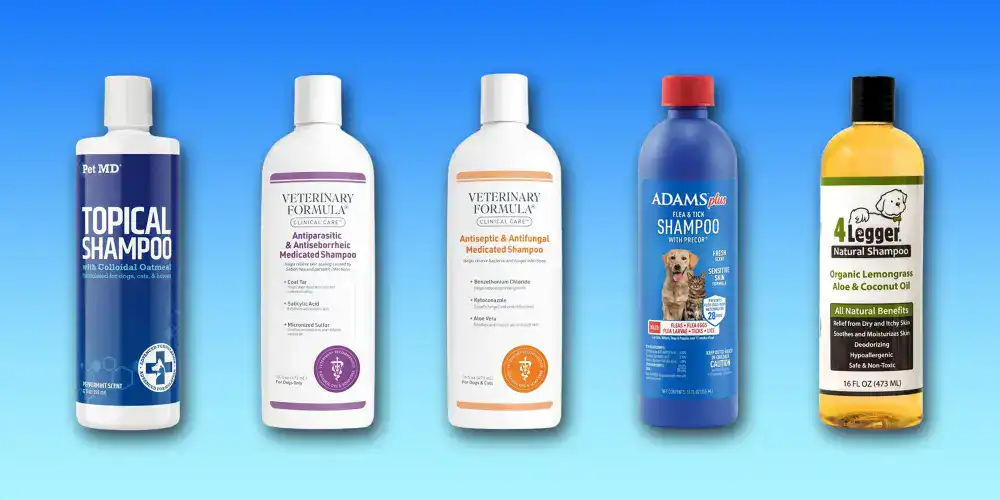In the vast world of hair care, finding the right medicated shampoo can be a transformative experience for those grappling with specific scalp or hair conditions. Whether it’s dandruff, lice, or a skin condition affecting your scalp or your pet’s fur, choosing the right product is essential. But with so many options on the market, how do you make the best choice? This comprehensive guide will walk you through the essentials of selecting the perfect medicated shampoo for your needs.
Medicated shampoos are uniquely formulated to address various scalp and hair conditions. Unlike regular shampoos, which primarily focus on cleaning and beautifying hair, medicated shampoos contain active ingredients designed to tackle specific issues. These issues might include dandruff, psoriasis, lice, or even certain infections.
The Science Behind Medicated Shampoos
Medicated shampoos contain active ingredients that target the root causes of scalp issues. These ingredients are scientifically developed to interact with the skin and hair, addressing the specific problems. For instance, antifungal agents in dandruff shampoos work by reducing the yeast on the scalp, which is often responsible for flakiness and itching.
How They Differ From Regular Shampoos
Regular shampoos primarily serve to cleanse the hair and scalp, removing dirt, oil, and product build-up. In contrast, medicated shampoos go a step further by delivering therapeutic benefits. They often contain higher concentrations of active ingredients that provide targeted treatment for conditions like seborrheic dermatitis or scalp psoriasis.
The Importance of Active Ingredients
Active ingredients are the cornerstone of medicated shampoos, determining their effectiveness for specific conditions. Each ingredient serves a distinct purpose, such as reducing inflammation, combating fungus, or alleviating itchiness. Understanding these ingredients is crucial to selecting a shampoo that will effectively treat your particular condition.
Common Conditions Treated
- Dandruff: Flaky, itchy scalp conditions can be managed with prescription medicated shampoos containing ingredients like ketoconazole or zinc pyrithione.Ketoconazole Shampoos: Known for their antifungal properties, they tackle the yeast responsible for dandruff.Zinc Pyrithione: This ingredient helps in reducing fungus and bacteria, providing relief from flakiness and itchiness.Long-Term Management: Regular use can prevent dandruff from recurring, maintaining a healthy scalp.
- Psoriasis and Eczema: Conditions that cause inflammation and scaling may require shampoos with coal tar or salicylic acid.Coal Tar Shampoos: Help reduce scaling and inflammation by slowing down the overproduction of skin cells.Salicylic Acid: Assists in removing scales and softening the skin, providing relief and promoting healing.Combination Treatments: Often used in conjunction with other therapies for enhanced results.
- Lice: Medicated lice shampoos often contain permethrin or other insecticides to eliminate lice infestations.Permethrin Shampoos: Act as a powerful insecticide used to kill lice and their eggs effectively.Pyrethrin Combinations: Often paired with other agents to ensure comprehensive lice removal.Preventing Reinfestation: These shampoos help break the lice life cycle, preventing future outbreaks.
- Seborrheic Dermatitis: This condition can be treated with shampoos that have selenium sulfide or ketoconazole.Selenium Sulfide: Reduces the production of natural oils, minimizing flakiness and irritation.Ketoconazole: Offers antifungal properties that address the root cause of seborrheic dermatitis.Routine Use: Incorporating these shampoos into your routine can provide long-term control.
- Pet Skin Conditions: Dogs can also suffer from skin problems, and medicated dog shampoo prescriptions are available for various conditions.Flea Treatments: Shampoos that include insecticides to combat flea infestations.Fungal Infection Solutions: Medicated shampoos that target fungal infections on pet skin.Veterinary Guidance: Always consult a veterinarian before using medicated products on pets.
When to Consider Prescription Medicated Shampoos
Prescription medicated shampoos are more potent than over-the-counter options and are typically recommended when regular shampoos fail to alleviate the problem. Here are situations where you might consider seeking a prescription:
Severe Dandruff or Psoriasis
If over-the-counter products aren’t effective, prescription options might be necessary. Severe dandruff or psoriasis can be persistent and challenging to manage, often requiring stronger interventions. Prescription shampoos contain higher concentrations of active ingredients, providing targeted relief for these stubborn conditions.
Recurrent Lice Infestations
Persistent lice problems may require stronger treatments. Over-the-counter lice shampoos might not suffice for severe infestations. Prescription options often include more potent insecticides that can effectively eliminate lice and prevent reinfestation, offering peace of mind for those battling this persistent problem.
Chronic Scalp Conditions
Conditions like seborrheic dermatitis that do not improve with regular shampoos might benefit from prescription-strength solutions. These shampoos are formulated to address the underlying causes of chronic scalp conditions, providing long-lasting relief. They often require a healthcare provider’s guidance to ensure they are used correctly for optimal results.
When to Seek Professional Advice
It’s crucial to consult a healthcare professional when considering prescription medicated shampoos. A dermatologist can provide an accurate diagnosis and recommend the best treatment plan for your specific condition. They can also monitor your progress and make adjustments as needed to ensure effective treatment.
Key Ingredients to Look For
When selecting a medicated shampoo, understanding the active ingredients can help you make an informed decision. Here’s a breakdown of common ingredients and their purposes:
For Dandruff and Seborrheic Dermatitis
- Ketoconazole: An antifungal ingredient effective against dandruff and seborrheic dermatitis.How It Works: Targets the yeast responsible for dandruff, reducing flakiness and irritation.Usage Guidelines: Often recommended for use twice a week for optimal results.Alternative Options: Available in both prescription and over-the-counter formulations.
- Zinc Pyrithione: Helps reduce fungus and bacteria, addressing flakiness and itchiness.Dual Action: Combats both bacterial and fungal elements, providing comprehensive relief.Long-Lasting Effects: Regular use can maintain a healthy scalp environment.Gentle Formulations: Suitable for daily use in many cases, offering gentle yet effective treatment.
For Psoriasis and Eczema
- Coal Tar: Reduces scaling and inflammation.Cell Regulation: Slows down the rapid growth of skin cells, alleviating psoriasis symptoms.Soothing Properties: Provides relief from itching and discomfort.Considerations: May stain clothing or have a strong odor; use with care.
- Salicylic Acid: Aids in removing scales and softening the skin.Exfoliating Benefits: Helps slough off dead skin cells, promoting a smoother scalp.Synergistic Use: Often combined with other treatments for enhanced effectiveness.Hydration: Encourages moisture retention, preventing excessive dryness.
For Lice Treatment
- Permethrin: A powerful insecticide used to kill lice and their eggs.Efficacy: Proven to be highly effective in eliminating lice infestations.Reapplication: Often requires multiple applications for complete eradication.Safety Precautions: Follow instructions carefully to avoid potential side effects.
- Pyrethrin: Another insecticide, often used in combination with other agents.Natural Origin: Derived from chrysanthemum flowers, offering a natural approach.Combination Formulas: Frequently paired with piperonyl butoxide for increased potency.Thorough Application: Ensures complete coverage for maximum effectiveness.
For General Scalp Health
- Salicylic Acid: Also useful for its exfoliating properties, promoting a healthier scalp.Regular Use: Encourages the natural shedding process, preventing build-up.Versatile Ingredient: Suitable for various scalp conditions, including dandruff and psoriasis.Balancing Effect: Helps maintain a balanced scalp environment, reducing oiliness.
- Selenium Sulfide: Decreases the production of natural oils, reducing flakiness.Oil Control: Effective for oily scalps, minimizing excess sebum production.Antifungal Action: Targets the root causes of dandruff and seborrheic dermatitis.Usage Recommendations: Typically used in rotation with other treatments for best results.
Tips for Choosing the Right Shampoo

- Consult a Dermatologist: Before opting for a prescription medicated shampoo, consult a dermatologist to get a proper diagnosis and treatment plan.Professional Guidance: A dermatologist can provide insights into your specific condition and recommend the most effective treatment.Tailored Solutions: They can help customize a regimen that addresses your unique needs and concerns.Ongoing Support: Regular follow-ups ensure your treatment remains effective over time.
- Understand Your Needs: Identify the specific condition you need to treat and choose a shampoo with ingredients tailored to that condition.Condition-Specific Choices: Select a shampoo that directly targets your symptoms and underlying issues.Ingredient Awareness: Familiarize yourself with active ingredients and their benefits for your condition.Flexible Options: Consider multiple products if you have more than one scalp issue.
- Follow Directions: Always follow the usage instructions provided by your dermatologist or on the shampoo label to ensure effectiveness and avoid side effects.Proper Application: Correct usage maximizes benefits and minimizes potential side effects.Consistency Matters: Regular use as directed is key to achieving desired results.Adapting to Changes: Be open to adjusting your routine based on your dermatologist’s recommendations.
- Patch Test: Before using a new shampoo extensively, do a patch test to check for any allergic reactions.Safety First: A patch test helps identify potential allergens, preventing adverse reactions.Simple Procedure: Apply a small amount on a discreet area and observe for any signs of irritation.Responsive Action: Discontinue use immediately if any redness, itching, or swelling occurs.
- Consider Your Hair Type: Some medicated shampoos can be drying, so if you have dry hair, look for options that are gentle or hydrating.Hydration Needs: Opt for shampoos with added moisturizers to prevent excessive dryness.Balancing Act: Find a shampoo that addresses your scalp condition without compromising hair health.Personal Preferences: Take into account texture, fragrance, and other factors that contribute to your overall satisfaction.
Medicated Shampoos for Pets

Just like humans, pets can suffer from skin conditions that require medicated shampoos. Prescription medicated dog shampoos can treat issues like fleas, dermatitis, and fungal infections. Always consult a veterinarian before using any medicated product on your pet to ensure it’s safe and appropriate for their condition.
Common Pet Conditions and Treatments
- Fleas and Ticks: Medicated shampoos often contain insecticides to combat infestations effectively.Preventive Measures: Regular use can prevent future infestations and keep your pet comfortable.Safe Formulations: Ensure the product is specifically designed for pets to avoid potential toxicity.Comprehensive Care: Pair with other flea and tick prevention methods for best results.
- Dermatitis: Specialized shampoos can soothe irritation and promote healing.Antipruritic Ingredients: Help relieve itching and discomfort, providing immediate relief.Healing Agents: Support skin repair and regeneration, fostering healthy skin.Consistency is Key: Regular use as part of a grooming routine can prevent flare-ups.
- Fungal Infections: Targeted ingredients address the root cause of fungal issues.Antifungal Action: Eliminates fungal pathogens, restoring skin health.Veterinary Supervision: Always follow your veterinarian’s guidance for safe and effective treatment.Monitor Progress: Keep an eye on your pet’s skin health and report any concerns to your vet.
The Role of the Veterinarian
A veterinarian plays a crucial role in diagnosing and treating pet skin conditions. They can recommend the best medicated shampoo for your pet’s specific needs and provide guidance on its proper use. Regular check-ups ensure your pet’s skin issues are effectively managed and that their overall health is maintained.
Understanding Potential Side Effects
While medicated shampoos can be incredibly beneficial, they can also cause side effects in some users. Common side effects include:
Irritation or Redness
Some ingredients may cause irritation, especially if you have sensitive skin. It’s essential to be aware of how your skin reacts to new products. If irritation occurs, discontinue use and consult a dermatologist. They can suggest alternative treatments or recommend soothing products to alleviate discomfort.
Dryness
Ingredients like coal tar and salicylic acid can dry out the scalp or hair. To combat dryness, consider using a conditioner or hair mask to restore moisture. Look for products with hydrating ingredients like aloe vera or argan oil. Regular use of moisturizing treatments can prevent excessive dryness and maintain scalp health.
Allergic Reactions
Although rare, it’s possible to have an allergic reaction to an ingredient. Symptoms may include itching, swelling, or a rash. If you suspect an allergic reaction, stop using the product immediately and seek medical advice. An allergy test can help identify the specific ingredient causing the reaction, allowing you to avoid it in the future.
Monitoring and Adjusting Treatment
It’s crucial to monitor your scalp’s response to a new medicated shampoo. If any side effects persist or worsen, consult your dermatologist for further evaluation. They can adjust your treatment plan as needed to ensure optimal results and minimize adverse effects. Regular follow-ups help maintain effective management of your scalp condition.
Conclusion
Choosing the right medicated shampoo involves understanding your specific needs, knowing the ingredients that will best address those needs, and consulting with healthcare professionals when necessary. Whether it’s a prescription medicated shampoo for dandruff or a medicated dog shampoo prescription for your furry friend, the right product can make a significant difference in managing scalp and skin conditions.
The Importance of Personalized Care
Effective treatment begins with the right diagnosis and product choice. Personalizing your hair care routine to suit your unique needs ensures better results and overall satisfaction. Take the time to explore your options, consider expert advice, and invest in quality products that align with your goals for healthier hair or fur.
The Role of Experts
Healthcare professionals, including dermatologists and veterinarians, play a vital role in guiding treatment choices. Their expertise ensures that you or your pet receive the most appropriate and effective care. Don’t hesitate to reach out for professional advice when navigating the world of medicated shampoos.
Commitment to Healthier Hair and Skin
Investing time in understanding your options and consulting experts when needed is key to achieving optimal results. A well-informed approach to selecting medicated shampoos empowers you to take control of your scalp and skin health. With the right products and guidance, you can manage conditions effectively and enjoy healthier hair or fur.




